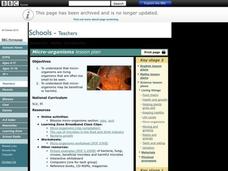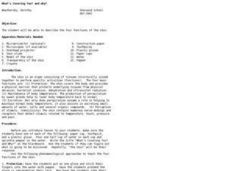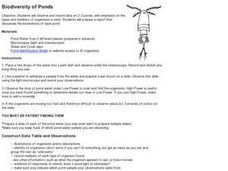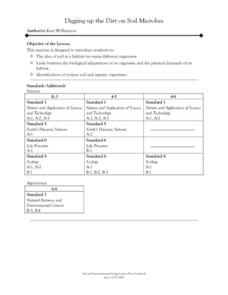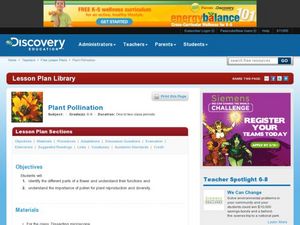Curated OER
What in the World..?!?
Students photograph mystery images. In this observation skills instructional activity, students gather everyday objects and place them under a digital microscope. They magnify the image and take a photograph of it. The image is then...
Curated OER
Just Because You Cannot See It... Doesn't Mean It's Not There
Students discover bacteria which is around them by using agar over three days. In this biology lesson, students predict what they will see over the three days and then take photographs of what is actually shown. Finally, students write...
Curated OER
Wildlife Variety Show: Biodiversity In Illinois
Eighth graders write a short report in first person about any plant or animal found on a list of Illinois species. They become the character of the plant or animal and give a short report describing the plant or animal.
California Academy of Science
Carbon Cycle Role Play
Anytime you make concepts clear with role playing or hands-on experience, it's a win for the whole class. Ping-Pong balls are used to represent carbon in a carbon cycle role-play activity. In small groups, children first discuss what...
Curated OER
Zoom into Microscopy
Learners discover proper microscope use. In this microscopy lesson, students create picture books that show the detail of organisms as seen with the human eye, through a hand lens, and at each power of the microscope.
Curated OER
The Effects of Osmotic Balance and Imbalance In Living Cells
Students investigate osmotic balance in living cells. In this osmotic balance lesson plan, students use elodea leaves to study the effects of salt solutions on the cell. They compare the changes in an elodea leaf with salt water on it to...
Curated OER
The Parts of a Perfect Flower
Young scholars explore the parts of a flower. In this flower structures lesson plan, students study a model of a flower and dissect a flower. They label each structure of the flower and observe the pollen grains and ovules under the...
Curated OER
Micro-Organisms
Students investigate microscopic life by viewing video clips. In this organisms lesson, students view photographs and video clips on the internet of micro-organisms and discuss the harms and benefits of the creatures. Students complete...
Curated OER
Chromosome Karyotyping
Students explore chromosome karyotyping. In this chromosome karyotyping lesson plan, students use a chromosome kit to explore chromosome syndromes and disorders. They also produce a large model of a cell with chromosome to simulate cell...
Curated OER
What's Covering You? and Why?
Students take a closer look at human skin. In this biology lesson plan, students describe the four functions of the skin as they complete a hands-on activity.
Curated OER
Biodiversity of Ponds
Students study the biodiversity in pond water. In this biodiversity lesson plan, students observe 3 samples of pond water using a pond water identification sheet. They record their findings and identify the organisms they find, the...
Curated OER
Observing Osmosis
Young scholars investigate osmosis using egg cells with the shells removed. For this osmosis lesson plan, students remove the shell of an egg by letting it soak in vinegar for two days. They take measurements and observe the cell. They...
Curated OER
Living Organisms as Indicators of Pollutants in Fresh Water Ecosystems
Students observe the effects of pollution on living organisms. In this pollution lesson plan, students observe fresh water Hydra and look at their structures and movement. They place samples of pond and lake water on the Hydra and...
Curated OER
Crystals
Students investigate crystal formation, their shapes and the best places to cleave crystals for smooth edges. In this crystal lesson plan, students experiment to form crystals with Salol as well as with copper wire and Silver Nitrate....
Curated OER
Dissecting Frog Embryos: Cell Membranes and Mitosis
High schoolers use high powered dissection microscopes to dissect and examine frog embryos as well as see balls of cells that were produced by rapid division. The concept of mitosis links to the lesson.
Curated OER
Root Caps and the Effect on Gravity Sensing
Students conduct an experiment to determine how the absence of a root cap affects a plant's ability to sense gravity. They make comparisons between capped and decapped roots.
Curated OER
Digging up the Dirt on Soil Microbes
Students are introduced to the idea of soil as a habitat for many different organisms. They are introduced to the links between the biological adaptations of an organism and the physical demands of its habitat. Pupils are introduced to...
Curated OER
Spore Drop
Young scholars observe the pattern of the inside of a mushroom and write down what they see. In this mushroom lesson plan, students cut a mushroom at the top and draw what they see in the spore of the mushroom.
Curated OER
It's Just a Phase They're Going Through!
In this science worksheet, students write about the stages of mitosis. Students prepare an onion slide and examine the cell.Students draw about the stages they see.
Curated OER
Plants: Scattering Seeds
Middle schoolers collect and microscopically examine seeds from the school yard and neighborhood. In small groups, they draw and discuss the shapes of the seeds to determine each plant's method of dispersal. they also test two types of...
Curated OER
Plant Pollution
Middle schoolers study the different parts of a flower and their functions. In this pollination lesson students study a flower under a microscope.
Curated OER
Invisible Life
By setting up an aquarium in the classroom, learners are able to describe some macroscopic and microscopic organisms that are found inside. This well-designed, and educationally rich lesson requires pupils to use microscopes to view...
Curated OER
Interdisciplinary Approach to Investigating Popcorn
Students conduct a lab experiment using the scientific method. In this interdisciplinary lesson plan, students will test the difference in popping white and yellow corn. Students will write their lab report in their science, math,...
Steinhardt Apps
Kinetic Molecular Theory
Building off young chemists' knowledge of the states of matter, kinetic molecular theory is the focus of the unit. Eight days of lessons including multiple demonstrations, one lab experiment, directed instruction, and worksheets,...









